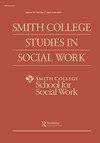在双重流行病中作为黑人和临床医生生存:疾病和种族危机中的个人和职业挑战
IF 0.9
Q2 SOCIAL WORK
引用次数: 15
摘要
抽象我无法呼吸!社交距离!我无法呼吸!保持六英尺的距离!我无法呼吸!一定要洗手!我无法呼吸!我什么时候可以安排会议?在全球疫情期间,身为美国黑人和心理健康专业人士的双重身份已经足够紧张了;然而,再加上同时发生的种族流行病,精神内部、人际关系和职业责任感不断。本文试图探索两名黑人心理健康专业人员在双重疫情期间居住在洛杉矶县并提供临床服务的生活经历。利用民族志方法,作者将反思他们在双重疫情期间作为黑人和心理健康提供者的个人和职业经历。将特别关注系统性种族主义、白人至上主义、白人脆弱性、反种族主义和第三空间压迫等问题,同时为白人和黑人客户提供临床服务,并试图参与持续的自我保健活动。此外,作者还将探讨在双重疫情期间研究种族认同、社会位置和职业期望之间关系的建议。本文章由计算机程序翻译,如有差异,请以英文原文为准。
Surviving Being Black and a Clinician During a Dual Pandemic:Personal and Professional Challenges in a Disease and Racial Crisis
ABSTRACT I CAN’T BREATHE! Social distance! I CAN’T BREATHE! Stay six feet apart! I CAN’T BREATHE! Make sure you wash your hands! I CAN’T BREATHEEEE! When can I schedule a session? The duality of being Black in America and a mental health professional during a global pandemic is stressful enough; however, coupled with a simultaneous racial pandemic, the intrapsychic, interpersonal and professional responsibilities feel incessant. This article seeks to explore the lived experiences of two Black mental health professionals residing and providing clinical services in Los Angeles County during a dual pandemic. Utilizing autoethnography methodology, the authors will reflect upon their personal and professional experiences of being Black and a mental health provider during a dual pandemic. Special attention will be allocated to unpacking issues of systemic racism, White supremacy, White fragility, anti-racism and third space oppression while providing clinical services to White and Black clients and attempting to engage in ongoing self-care activities. In addition, the authors will explore recommendations examining the nexus between racial identity, social location and professional expectations during a dual pandemic.
求助全文
通过发布文献求助,成功后即可免费获取论文全文。
去求助
来源期刊

SMITH COLLEGE STUDIES IN SOCIAL WORK
SOCIAL WORK-
CiteScore
1.50
自引率
10.00%
发文量
10
期刊介绍:
Smith College Studies in Social Work focuses on the vital issues facing practitioners today, featuring only those articles that advance theoretical understanding of psychological and social functioning, present clinically relevant research findings, and promote excellence in clinical practice. This refereed journal addresses issues of mental health, therapeutic process, trauma and recovery, psychopathology, racial and cultural diversity, culturally responsive clinical practice, intersubjectivity, the influence of postmodern theory on clinical practice, community based practice, and clinical services for specific populations of psychologically and socially vulnerable clients.
 求助内容:
求助内容: 应助结果提醒方式:
应助结果提醒方式:


